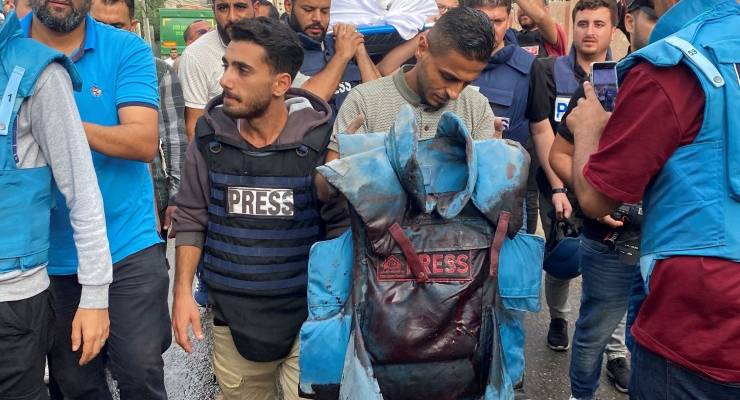
The decision of Nine newspaper editors Tory Maguire, Patrick Elliget, Bevan Shields and David King to gag journalists who have called for balance in media coverage of the Israel-Palestine conflict is the most serious assault on a free press since the Coalition government’s raids on Annika Smethurst and the ABC — but is one wholly self-inflicted.
How Nine can purport to champion a free press from now on is a mystery, when it censors its own journalists — while engaging in exactly the kind of biased coverage those journalists have condemned.
Nine’s refusal to cover the ongoing campaign of terrorism and ethnic cleansing being carried out by Israeli colonists on the West Bank, with the complicity of the IDF and Israeli police, has become increasingly embarrassing as the issue has received greater and greater prominence elsewhere in the world. Not only has it become a major irritant in US-Israel relations, to the point where the Biden administration has revealed it will sanction perpetrators, new UK Foreign Secretary David Cameron raised it directly with Benjamin Netanyahu on his visit to Israel and the West Bank last week.
Four days ago, Israeli media reported that the head of Israel intelligence service Shin Bet, and a senior IDF general, warned that Israeli police were refusing to take any action against Israeli colonists in the West Bank, under direct orders from far-right Netanyahu government Security Minister Itamar Ben Gvir.
Ethnic cleansing and terrorism aimed by Israeli colonists at Palestinians, with the official sanction of the Israeli government, is a story in and of itself worth reporting. How often do other governments have to raise the issue, and how much evidence from Israel itself is needed, before Nine newspapers deem the story worthy of coverage?
No wonder many of its staff want balance applied. Nine newspapers transparently lack balance and are heavily favouring Israel in their coverage.
Instead, the response of its editors is to gag those staff from playing any role in improving its lopsided reporting.
At the ABC, news head Justin Stevens has warned staff not to sign open letters “that may bring into question your impartiality or that of the ABC’s coverage.” The ABC, at least, has devoted considerable space to reporting on ethnic cleansing and terrorism on the West Bank, reporting on the attacks and the international reaction to them over a dozen times since the Hamas atrocities began the latest round of conflict, after having reported on the issue repeatedly throughout the year and earlier.
As former Age editor Michael Gawenda’s incoherent attack on an earlier open letter also demonstrated, Nine’s gagging of its own journalists has a huge problem of selectivity: why this open letter, why now? Why not another of the myriad open letters that have formed part of Australian journalism, on a host of issues, in recent years? All of them suffer from the same alleged flaw, of giving rise to the perception that journalists’ personal views might influence their reporting.
In this case, however, the core of the open letter is to call for practitioners of journalism to do journalism better — to condemn the killing and targeting of journalists covering the conflict, to be sceptical of all sides engaged in a military conflict, to provide necessary context, and to disclose participation in “study tours” to the region — something at least three of the four Nine editors who are censoring journalists routinely fail to do.
If the position of Nine’s editors is that it is wrong to call for balanced coverage, scepticism of the claims of the powerful, necessary context, appropriate disclosure, and to condemn the at best reckless and likely intentional killing of journalists — and that anyone who does so must be censored — then they can’t seriously be called journalists, nor can anyone who backs such a policy. At the most charitable, they’re peddling a childish fantasy that privileged, rational journalists (usually white male journalists) can magically achieve objectivity from the commercial interests they work for, their own conditioning and the social, cultural and economic conditions they work in. At worst, they’re enabling “journalism” that is about reinforcing existing power structures and punching down at their victims.
The next time Nine purports to defend a free press — an act, of course, that surely draws into question its newspapers’ ability to objectively cover such issues as media regulation and national security issues — the easiest answer from any politician or national security bureaucrat is, whatever we’re doing might be bad, but at least we’re not gagging journalists. Those who harbour an agenda to curb reporting of areas deemed too “sensitive” or embarrassing for media exposure will be happy indeed that Nine has set such a useful example.
Disclosure: Bernard Keane participated in a study tour to Palestine in 2016 organised by the Australia Palestine Advocacy Network.








Crikey encourages robust conversations on our website. However, we’re a small team, so sometimes we have to reluctantly turn comments off due to legal risk. Thanks for your understanding and in the meantime, have a read of our moderation guidelines.